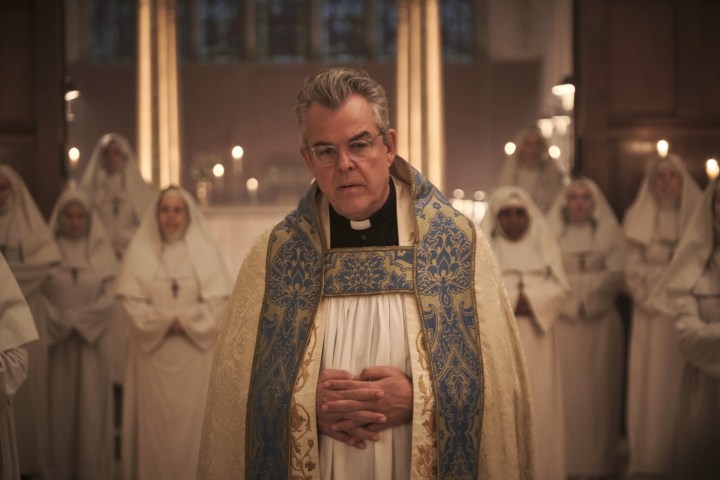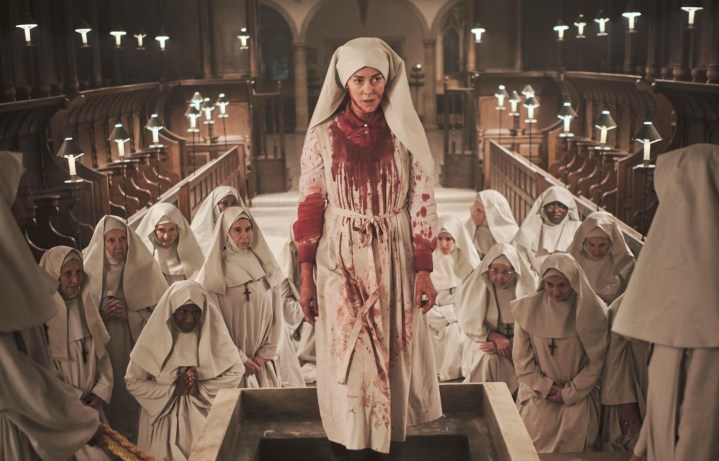
“The holy horror film Consecration wastes a good setup with a confusing and hollow climax.”
- A good first hour
- Moody atmosphere
- An intriguing performance from Jena Malone
- A ridiculous ending that makes no sense
- Lacks purpose and identity
Some movies don’t know how to start and take a while to get you hooked. Not so with Consecration, the new horror movie from Christopher Smith, which almost literally starts with a bang. The movie opens with a young woman walking down a street on a seemingly ordinary day in London. An elderly nun emerges from out of nowhere and approaches her. Cloaked in her white nun’s habit, the old lady smiles serenely as she takes out a gun and points it at the young woman, who looks as shocked as the audience is at this sudden turn of events.
Not a bad way to begin a movie, right? What drove this nun to this desperate, uncharacteristic act? Is she evil? Is the young woman? For a good hour into its 90-minute runtime, Consecration holds up as a genuinely intriguing supernatural horror film that contains better-than-usual cinematography and direction, as well as a standout performance from its lead actress. But as soon as it has to reveal its central mystery, Consecration stumbles, and you realize this movie is all setup and no payoff. It’s a shame, because what came before it had so much promise for the movie to be better than what it turns out to be.
Unholy happenings

After that excellent prologue, Consecration flashes back to a few months earlier. The young woman about to be gunned down by that nun is revealed to be Grace (Jena Malone), an eye doctor living in London. Her mundane existence is quickly shattered by the news that her brother, Michael (Steffan Cennydd), a priest in a remote Scottish village, has died. What’s worse is that he killed himself after murdering another priest. Of course, Grace doesn’t believe her brother would harm himself, let alone another man of the cloth, so she travels to the parish to investigate.
Once there, she quickly discovers something isn’t quite right. The nuns all seem to be carrying a secret that they want to tell but can’t. The Mother Superior (Janet Suzman) is definitely hiding something she has no intention of revealing. And the head priest, Father Romero (Danny Houston), is just a little bit too charming for Grace’s comfort. What really happened to her brother?
Grace is aided a bit by a detective (Thoren Ferguson, lost in an underwritten role), but she mostly goes it alone in figuring out what he the hell is going on. It helps that her brother left a diary behind, written in code that only Grace can decipher, which unlocks several extended flashbacks to the siblings’ abusive religious upbringing. It’s gradually revealed that Grace herself is more tied to the convent, and why her brother killed himself, than she would like to believe, and the movie soon barrels toward a finale that involves numerous stabbings, broken bones, and spectral time travel. (Don’t ask.)
Not good enough to be decent, and not bad enough to work

The journey can be just as enjoyable as the destination, and to its credit, Consecration is a pretty effective horror movie for its first hour. Its director, Smith, has good sense of establishing mood, and along with cinematographers Rob Hart and Shaun Mone, uses the beautiful Scottish scenery to strike a foreboding mood. He also patiently builds up the central mystery of Michael’s death and establishes Grace as an effective, if somewhat unreliable narrator. It’s hard to conjure up a proper atmosphere that would make all of this holy horror somewhat believable, but Smith pulls it off and, for awhile, Consecration successfully balances Grace’s grief with otherworldly revelations.
Smith is aided immensely Malone, who grounds Grace with a matter-of-fact sternness that slowly gives way to a grudging belief in supernatural shenanigans. Ever since her breakout role in the 1996 film Bastard Out of Carolina, Malone has been one of the most consistently reliable actors in the business, never failing to make any project she’s in (from blockbuster junk like Sucker Punch to arthouse junk like The Neon Demon) just a little bit more enjoyable. Even when the movie quickly craters at the end, Malone still makes you invested in what happens to Grace.
But man, is that ending a mess. It’s clear that the writers, Smith and Laurie Cook, didn’t know how to conclude the movie, or even what Grace is supposed to represent. Is she a living symbol of a supernatural deity? Is she a fallen angel who performs “miracles” as an eye doctor? Or is she the Devil reborn? The movie is structured in such a way that all three of these things could be true, yet not enough support is given to make any one of them believable or satisfying.
Wasted potential
What you’re left with is a confused climax that wastes all of the goodwill that was built up at the beginning. Smith clearly is influenced by horror movies of the past, and it’s not too much of a stretch to believe that Consecration could have joined The Wicker Man and Midsommar as classics in the “isolated community horror” subgenre.
But the story lets all involved down by being unfocused and unsure of what it wants to be. What was initially promised as a deep exploration of the violent nature of faith, or even a high-class copy of The Omen, turns out to be a whole lot of hokum. I’m usually fine with that, but it has to be backed by a confidence in what the movie is trying to do. That’s what is missing in Consecration, and that’s a sin even God can’t forgive.
Consecration is currently playing in theaters.
Editors' Recommendations
- Like the Netflix hit Thanksgiving? Try watching these 3 scary horror movies
- 5 great holiday-themed horror movies like Eli Roth’s Thanksgiving
- 3 great PG-13 horror movies to check out if you like the Five Nights at Freddy’s movie
- 5 best horror movies of 2023 so far
- Smile review: A cruelly scary studio horror movie




